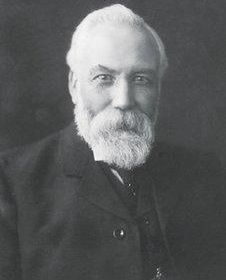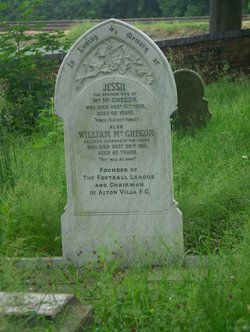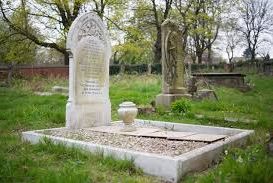William McGregor

William McGregor was and remains the most important figure ever not just in specifically professional football but professional sport generally. Yet, whilst he might well as a child have seen the traditional 'Ba-game played locally, he was never a player of any note, not least because he was already almost thirty and had by then in any case taken himself South by the time in 1873 association football began to explode in his native land, and then in the industrial West not in his rural Perthshire.
Born in 1846 and growing up in the village of Braco he was the youngest, surviving son of a mother from nearby Muthill and a father, a tailor to trade, from Balquidder. And, having in Scotland first been a student teacher and then apprentice draper in Perth itself William had already by 1870 joined his elder brother, also a draper, and two elder sisters in England, in growing, north Birmingham, there opening a drapery shop on Summer Lane by Aston. So how he exactly became involved in local football remains something of a mystery, although it may have been through the contagion carried across the border by fellow and more involved members of the Scots Diaspora. The rugby-playing Fifer, John Campbell Orr, and Rhu-born, footballing John Carson, ex. of Queen's Park had in south Birmingham in 1873 formed Calthorpe F.C., with which McGregor became involved, perhaps even officiating as a then on-field umpire. That was before he transferred his loyalty to the from-1874 emerging and more local Aston Villa team, which really began take off in 1876 with the arrival of its own Scots, Glasgow's George Ramsay and the Lindsay brothers, and the opening of its Perry Barr ground.
Meantime, although William's siblings moved on as he remained, links with home had been maintained. In 1876, whilst William, now living in Birchfield, half-way between shop and ground, married in Aston, his bride was Jessie Scrimgeour from Moneydie, a village just outside Perth. They were to have two children, a boy and a girl, both Birmingham-born, and would settle close to what was a clearly prospering business. It would would become a meeting place for local football enthusiasts as in 1877 McGregor was asked to join the Villa committee, becoming the club administrator (and saving it from bankruptcy) with Ramsay as club captain. He was then involved in the recruitment in 1878 of Ayrshire's Archie Hunter,, the following year of his brother, Andy, that same year, under the Presidency of Peterhead's George Kynloch, becoming a club Vice-President alongside Fergus Johnstone, from Dumfries-shire, and in 1880 assuming the presidency itself.
There is little doubt that under McGregor's influence Aston Villa changed from an amateur to a shamateur club and under his leadership became openly professional, when it was legitimised in 1885. He was then instrumental the following year in the appointment of its first "manager", the recently retired George Ramsay. But one problem remained, finance, that neither irregular friendly-games or potentially short-lived FA Cup runs could be relied upon to resolve. And it is to this that McGregor now turned his attention, in early 1888 proposing a competition between a limited number of like-minded, mostly North-English clubs with most importantly a season-long, guaranteed fixture list. It was an idea, originally to be known as The Association Football Union, that was seized upon and by September that same year was implemented at The Football League. It was also an idea that, whilst not without its problems in the original election/franchise or subsequent relegation/promotion formats, has since been adopted by not only every footballing country at multiple levels but also by pretty well every team sport, professional and amateur alike and worldwide.

William McGregor, the Perthshire, country-boy, had with the Football League very much ceased to be just a draper but became, notably for the next half-decade, one of the two most powerful of figures in burgeoning UK football. He remained Chairman of the League Committee until 1893, became because of health issues President and then Life-member. He also served, under the Presidency of the also Scots Lord Kinnaird, as chairman of the Football Association from 1890 to 1894.

However, by the middle of 1890s those same health issues caused him, to aid recovery, somewhat to slow down. Into the new century he concentrated his energy more on his own business and his club, which was one of the great successes of the decade both financially and in terms of trophies. In fact his wife was to pre-decease him, dying, apparently at the shop premises, in 1908 at just sixty, after which he moved in with his married daughter. But within little more than a year he himself began to deteriorate to the extent that by late 1911 he had been transferred to a nursing-home in the city. It was there in December that year that he was to pass away, to be buried unpretentiously in a now-restored grave alongside Jessie in the local St. Mary's Churchyard in his adopted Handsworth.
Birth Locator:
Residence Locations:
1861 - 18, Front St., Braco, Perthshire
1871 - 306, Summer Lane, Newtown/Aston, Birmingham
1876 - Albert Road, Aston, Birmingham
1881 - 301, Summer Lane, Newtown/Aston, Birmingham
1891 - 9, Witton Road, Aston, Birmingham
1901 - 7, Birchfield Road, Aston, Birmingham
1911 - 8, Salisbury Road, Birchfield, Handsworth, Birmingham
Death Locator:
1911 - Miss Storer's Nursing Home, 70, Newhall St., Birmingham
Burial Locator:
St. Mary's Churchyard, Handsworth, Birmingham
Back to the Perthshire Trail
or the SFHG Home page